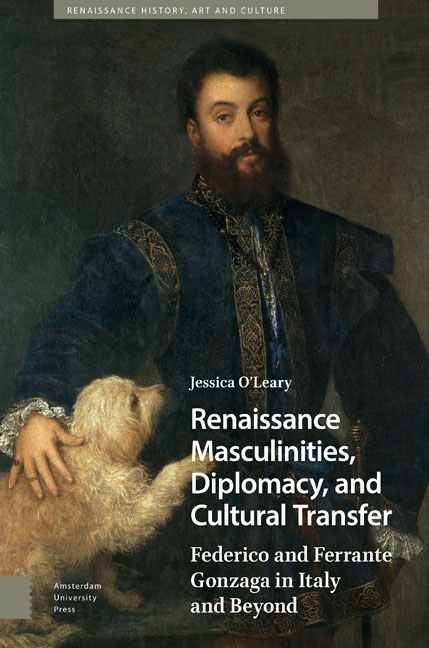 Renaissance Masculinities, Diplomacy, and Cultural Transfer
Renaissance Masculinities, Diplomacy, and Cultural Transfer Published online by Cambridge University Press: 08 May 2024
Abstract
This chapter examines the sojourn of Federico Gonzaga at the court of Francis I between 1515 and 1517. Using archival and published epistolary and diplomatic records, I argue that Federico developed a strong understanding of the new political culture that emerged in the 1510s as a result of Francis I, Henry VIII, and Charles V coming to power. Unfortunately, this clashed with his father’s, Francesco Gonzaga, existing understanding of relationship management with foreign powers. The resulting tension between father and son is illustrative of the generational changes to Italian political culture during the Italian Wars.
Keywords: Gonzaga, Italian Wars, Gender, Francis I, Mantua, Diplomacy
In January 1515, at just twenty years of age, Francis I became the King of France, and, like his predecessor Louis XII, almost immediately turned his attention to the Italian peninsula. He wanted to reclaim Milan for the French after the Swiss had routed Louis's armies at the Battle of Novara (1513). Competitive and impatient, the young monarch led his men over a secret Alpine passage and surprised the papal commander, Prospero Colonna, behind enemy lines. Although the Swiss almost immediately surrendered Milan and the incumbent duke, Massimiliano Sforza, one commander compelled his troops to resist the French and the two armies clashed at the burnt-out village of Marignano on the outskirts of Milan. Francis emerged victorious, and the decisive Gallic victory affirmed the arrival of a talented new warrior king and the decline of the famed Swiss infantry. Yet, the Battle of Marignano was more than a military encounter; it was a clash of cultures, a clash of ideologies, and a clash of generations.
Marignano marked a changing of the guard in the Italian Wars. The new King of France was only two when the Wars began, and he brought a new style of rulership to the battlefield and to the Valois court. Meanwhile, many of the Wars’ original combatants were either dead or in decline, either as a result of the pox, like Francesco Gonzaga, or devastation to formerly rich agricultural lands, like the March of Monferrat, trampled by cavalry, infantry, and carts laden with heavy artillery.
To save this book to your Kindle, first ensure no-reply@cambridge.org is added to your Approved Personal Document E-mail List under your Personal Document Settings on the Manage Your Content and Devices page of your Amazon account. Then enter the ‘name’ part of your Kindle email address below. Find out more about saving to your Kindle.
Note you can select to save to either the @free.kindle.com or @kindle.com variations. ‘@free.kindle.com’ emails are free but can only be saved to your device when it is connected to wi-fi. ‘@kindle.com’ emails can be delivered even when you are not connected to wi-fi, but note that service fees apply.
Find out more about the Kindle Personal Document Service.
To save content items to your account, please confirm that you agree to abide by our usage policies. If this is the first time you use this feature, you will be asked to authorise Cambridge Core to connect with your account. Find out more about saving content to Dropbox.
To save content items to your account, please confirm that you agree to abide by our usage policies. If this is the first time you use this feature, you will be asked to authorise Cambridge Core to connect with your account. Find out more about saving content to Google Drive.